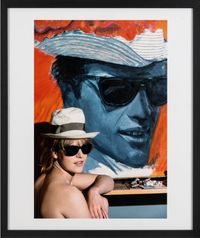
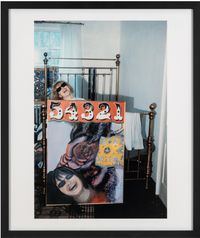
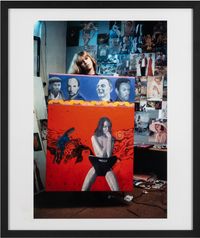
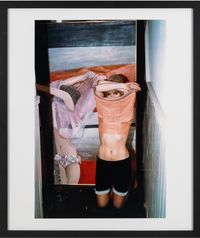
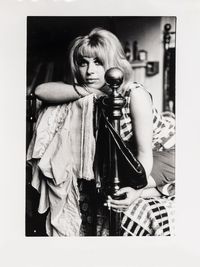
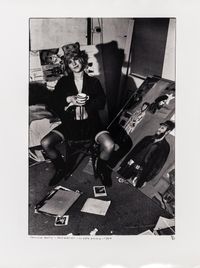
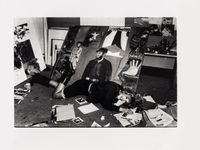
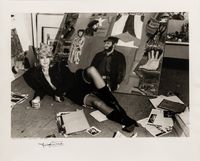
Gazelli Art House celebrates the life and legacy of trailblazing British painter Pauline Boty (1938–1966) in her first posthumous solo exhibition in a decade.
Pauline Boty: A Portrait presents a remarkable opportunity to view Boty's coveted paintings in unison, alongside a plethora of profound, archival materials. Marking the artist's third showing at Gazelli Art House, this exhibition continues the gallery's explorations of Boty's pivotal and enduring artistic impact. Pauline Boty: A Portrait marks over twenty years since Pauline Boty – The Only Blonde in the World (The Mayor Gallery and Whitford Fine Art, London), and ten years since Pauline Boty: Pop Artist and Woman (Wolverhampton Art Gallery, UK, touring to Pallant House Gallery) curated by Boty specialist and author, Dr Sue Tate. Pauline Boty: A Portrait will be accompanied by a talk and a brand new Gazelli publication, featuring commentaries from leading Boty experts.
A prominent figure in the British Pop Art movement of the 1960s, Boty waylaid convention with her fearless exploration of femininity, societal norms, politics, and popular culture. Eschewed the esteem of her male contemporaries, and customarily eclipsed by preoccupations with her beauty and the tragedy of her untimely passing, Boty's artworks are today venerated as climacteric within the cultural discourse surrounding the period.
In the pivotal early work Self Portrait (c.1955), Boty's instinctual painterly ability delivers an immediate, and human, intensity. Elsewhere, Untitled (Landscape with Rainbow) (1961), seen in Ken Russell's Young British Artists documentary Pop Goes the Easel (1962), is a rare abstract created concurrently with Boty's graduation thesis on the rendering of dreams. Here, candied forms drift about an ochre and white expanse with all the turbulence of the 'swinging' sixties and the social unrest on the horizon. These bold, early abstracts are, Prof. David Alan Mellor states, 'inflected by the Cohen brothers and the emblematics of Allen Jones's rereadings of Dealauny and Kandinsky'.
The influence that film, alongside popular music, played upon Boty's practice is evidenced in works such as Colour Her Gone (1962), With Love to Jean-Paul Belmondo (1962), and Monica Vitti with Heart (1963). Dr. Sue Tate notes that, in press interviews the artist spoke of a 'nostalgia for now' for 'present day mythology'. As with myth, Boty's paintings are laced with symbolism, where a rose may become an unapologetic allegory for female sexuality. These paintings demonstrate the abstract strewn apart and montaged with the figurative, in what would become Boty's distinctive, painted collage technique.
From popular culture to political musings, in Cuba Si (1963) – named for Chris Marker's 1961 film of the same name – Boty delivers a complex critique on a Postwar U.S. that denotes the artist's 'ongoing interest in Cuba', says Author Marc Kristal. When we consider the term 'Political Pop' did not emerge until the 1980s, it would be by no means overzealous to suggest Boty was ahead of her time.
Yet, in many ways, Boty was so of her time, so attuned to the charge of change, and perhaps that energy is what resonates still so powerfully today. Boty's appearances across stage, screen, and radio – including Alfie (1966), and Frank Hilton's Day of the Prince (1963) at the Royal Court Theatre (for which Boty also designed the programme) – are here exemplified in video footage. In archival photographs within the exhibition we glimpse aspects of the artist's vivid personality: Boty lies nude atop a chaise-longue, sits contemplative with two black cats, and mimics the actions of her painted subjects.
The significance of this exhibition is not only to draw attention to the radical artworks and ideas of Boty, and the new wave of feminism she undoubtedly heralded, but also to credit the efforts of recent years to rightfully reinstate Boty within the art historical canon.
Press release courtesy Gazelli Art House.
39 Dover Street
London, W1S 4NN
United Kingdom
www.gazelliarthouse.com
+44 207 491 8816
Mon - Fri, 10am - 6pm
Sat, 11am - 7pm
Sun by appointment